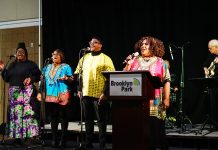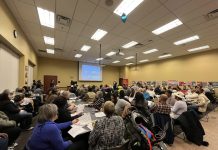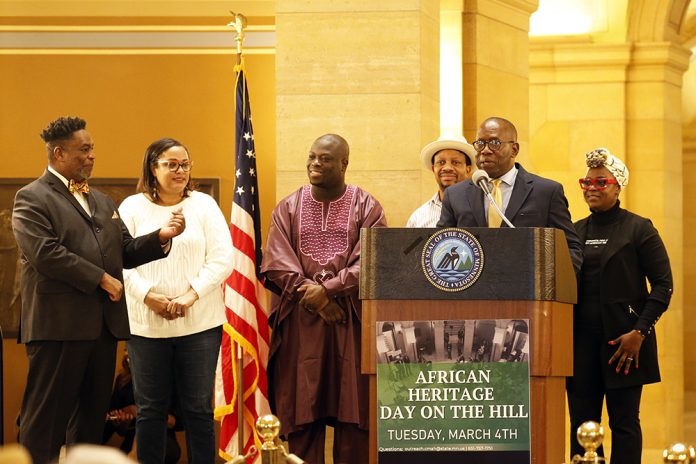
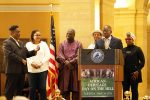
The Minnesota State Capitol rotunda was a hub of activity as a few dozen people gathered Tuesday afternoon for African Heritage Day on the Hill. The annual event, organized by the Council for Minnesotans of African Heritage (CMAH), connects Black Minnesotans with state lawmakers to discuss legislation that affects them, and to highlight the council’s legislative priorities.
Governor Walz, Minnesota Senate president Bobby Joe Champion and St. Paul Mayor Melvin Carter were among those who spoke – as well as legislators. CMAH was created by state statue and advises the state legislature and the Governor on issues confronting People of African Heritage.
Turnout at this year’s event was markedly smaller than previous ones, especially since coming back from a pandemic induced hiatus in 2023. The last two events post-covid have been standing room only in the rotunda as all the 100 plus seats are taken and another 100 plus people stand. This year, only about half of the seats were taken. It took place during a moment of reflection and disappointment after Kamala Harris’ loss to Trump in November.
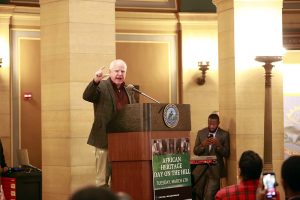
With Donald Trump’s return to the White House and the Minnesota GOP enjoying a temporary majority in the Minnesota House, there has been a rush by Republicans at the federal and state level to eliminate programs that have worked in ensuring the upward mobility of the Black community.
Even with the lower turnout, advocates for the Black agenda and regulars at the Day on the Hill see the value of bringing Black constituents to the annual event.
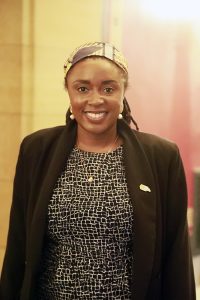
“For us at the Forum our mission is to create radical futures in Minnesota where justice and opportunity are actualized but we have to ground ourselves in the present moment to understand what is happening in the political landscape on the everyday lived experience of Black Minnesotans, and be ready to respond to that,” Amber Jones, the managing director for policy impact at African American Leadership Forum, a Minneapolis-based think tank that focuses on anti-Black racism and systemic inequities, told Mshale.
Black Minnesotans should not however be paralyzed by actions that threaten to undermine gains the community has made, Jones said. Organizations like hers are still doing the work that needs to be done to uplift the Black community. “We cannot lose sight of the vision even with what is going on otherwise the community will splinter, for us at the Forum its all about how do we continue to do the research and community engagement that is so important.”
Nelima Sitati Munene, executive director of African Career, Education, & Resource Inc. (ACER), a Brooklyn Center based nonprofit focused on eliminating barriers for the African immigrant community, agrees with Jones that the Black community should not allow actions at the federal level to distract it, and events like the Day on the Hill are critical. However, she said the Trump administration freezing of all federal grant spending has affected her organization, albeit not to the level that would affect operations as has been the case at other nonprofits. Despite a judge’s order that the administration release all frozen funding, her organization is still waiting to be paid by the federal government for work it already did.
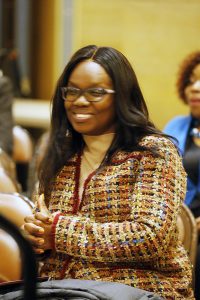
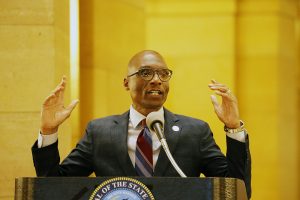
“We have not been impacted in a major way but we are still yet to be reimbursed by the federal government for work we did in the last quarter just before the freeze (by Trump) happened. That is how federal grants work, you spend money and do the work first before you get reimbursed, but now with the layoffs at the federal agencies you can’t even talk with your case manager” Sitati Munene said. “That is why a lot of the nonprofits have to let people go because they have spent the money for the work, but no reimbursement is forthcoming. Senators (Tina) Smith and (Amy) Klobuchar’s offices have really been helpful in trying to get all these sorted out, we talk almost every day.”
The Organization for Liberians in Minnesota (OLM), which provides a range of services for those from Liberia, has seen levels of anxiety among its people rise since Trump was sworn in for a second term. Kamaty Diahn, OLM’s executive director, told Mshale that it was actually Trump, during his first term, that signed the law allowing a pathway to citizenship for Liberians that were on Temporary Protected Status (TPS) — but that now the same Trump is ending TPS for Haitians and Venezuelans.
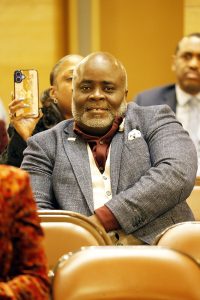
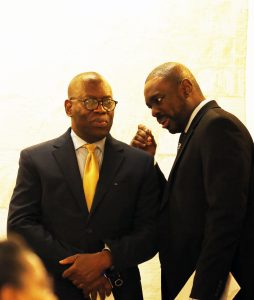
Diahn said he was at Tuesday’s event to show solidarity with those affected by the latest Trump adverse executive orders, especially on immigration. He said there are some Liberians who despite Trump giving them a pathway to citizenship have not been able to make the transition to a green card, and could be subject to deportation.
“The advice I have for any Liberian who was on TPS and did not take advantage of the law Trump signed in his first term giving us a pathway to citizenship is to seek legal counsel urgently and discuss your personal situation with an expert,” Diahn said.
The layoffs and uncertainty at the federal level are also things that occupy the mind of Theo Rose, the legislative and policy director at CMAH. He spoke to Mshale at the reception that followed the event and stated that it is two things that are especially worrying for him – budget cuts and rollbacks, at both the federal and state level. Moves, he said that will negate some of the recent gains the Black community has made.
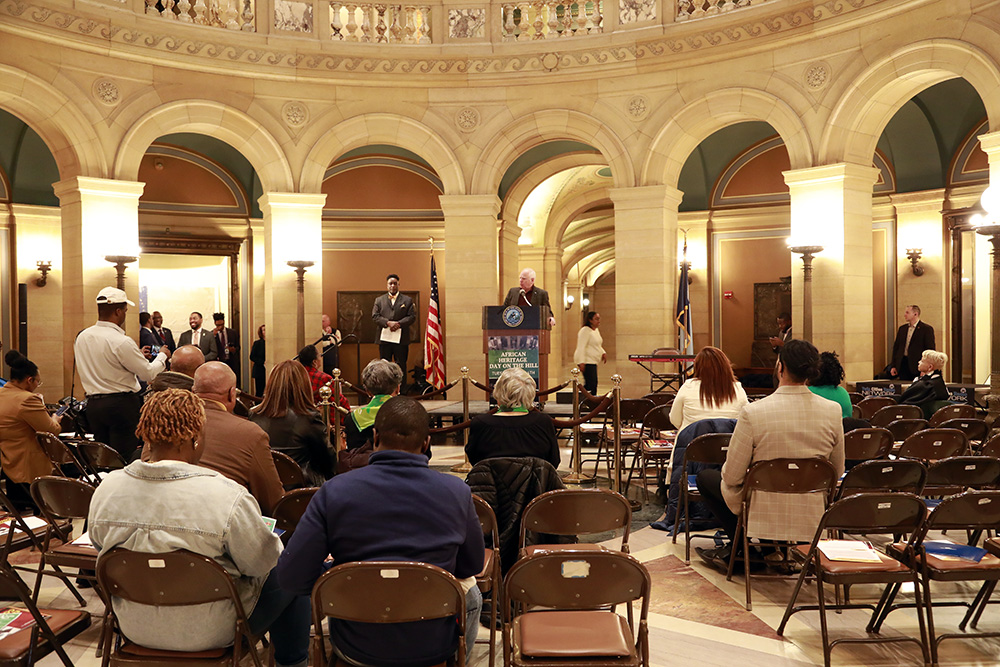
“We are definitely concerned by bill proposals at the legislature that would undo our state’s commitment to antiracism and immigrant inclusion in our education, health and public safety systems,” Rose said, referencing one of CMAH’s public policy priorities. “Instead of cutbacks, the feedback we have received from the community is that our state must find ways to boost investments that close opportunity gaps.”
About Tom Gitaa Gitaa, Editor-in-Chief
Born and raised in Kenya's coastal city of Mombasa, Tom is the Founder, Editor-in-Chief and Publisher of Mshale which has been reporting on the news and culture of African immigrants in the United States since 1995. He has a BA in Business from Metro State University and a Public Leadership Credential from Harvard’s Kennedy School of Government. He was the original host of Talking Drum, the signature current affairs show on the African Broadcasting Network (ABN-America), which was available nationwide in the United States via the Dish Network satellite service. On the show, he interviewed Nobel laureates such as 2004 Nobel Peace prize winner, Professor Wangari Maathai, the first woman from Africa to win the peace prize and heads of states. Tom has served and chaired various boards including Global Minnesota (formerly Minnesota International Center), the sixth largest World Affairs Council in the United States. He has previously served as the first Black President of the Board of Directors at Books for Africa. He also serves on the boards of New Vision Foundation and the Minnesota Multicultural Media Consortium. He has previously served two terms on the board of the United Nations Association. An avid runner, he retired from running full marathons after turning 50 and now only focuses on training for half marathons.
- Web |
- More Posts(455)



